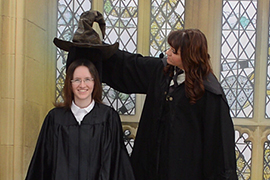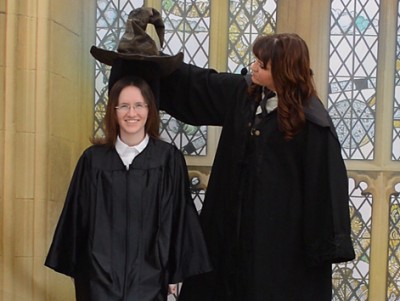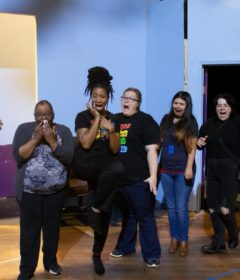Stetson University Researcher Shows Fiction Reflects Reality


What Harry Potter can tell us about ourselves
If you’ve ever read the Harry Potter series of books or seen the movies, then you may have wondered about the “sorting hat” — a pointed, weathered wizard’s hat used to place the Hogwarts students into the correct residence.
You may even have wondered into which house the hat would have sorted you.
“Research shows that fiction may be a primary source for peoples’ beliefs about their world,” said Laura Crysel, Ph.D., an assistant professor of psychology at Stetson University, “but psychologists have largely overlooked the key role it may play in understanding social psychological processes.” In other words, fiction may simulate and explain our personal and social world, and influence our perceptions of it.
Crysel and her co-authors pursued that line of questioning in their recent research, “Harry Potter and the Measures of Personality,” due to appear in the journal Personality and Individual Differences this fall.
“The Harry Potter book series may be valuable through its ability to teach readers about their own personalities,” said Crysel. “If people can relate to and see themselves in characters who epitomize certain qualities, can fiction reflect real underlying personality dimensions?”
Crysel, whose research focuses on the Dark Triad traits of narcissism, Machiavellianism and psychopathy, believes that storytelling and fiction helps us understand more about our social world and ourselves.
“Literature and movies are littered with these dark characters,” said Crysel. “Lord Voldemort in the Harry Potter books, Darth Vader in Star Wars, and Macbeth in Shakespeare’s play,” are all examples of characters that exhibit Dark Triad traits.
In her research, Crysel applied the Dark Triad traits as well as Schadenfreude (happiness at another’s misfortune) and the Big Five personality traits, to the different Hogwarts School communities or houses created by J.K. Rowling in her famous Harry Potter series.
“I wondered if the different measures of personality fit those sorted into each of the Hogwarts houses,” said Crysel. That is, extraverted and brave Gryffindors; agreeable and loyal Hufflepuffs; clever and witty Ravenclaws; and manipulative, ends-justifies-the-means Slytherins.
To test that, Crysel and her co-authors asked fans from online Harry Potter groups which house Rowling’s online sorting quiz assigned them, and then looked to see if their personalities fit the above traits. Researchers recruited participants from Tumblr, Twitter and Facebook, with cooperation from the Harry Potter Alliance/Portkey Fan Convention, who had already taken the sorting quiz on the Pottermore website.
“To our knowledge, ours is the first empirical test of whether group-based traits in a popular work of fiction accurately reflect actual personality trait differences,” said Crysel. Fortunately, the Hogwarts house traits are reasonably similar to empirically established personality constructs, such as the Big Five traits, need for cognition, and the Dark Triad traits, according to Crysel.
“We compared people’s house-placement results from Pottermore’s sorting quiz to their scores on these established constructs,” said Crysel.
The results?
“For the most part, our hypotheses were supported,” said Crysel. “We found that Rowling’s sorting quiz taps into some of the traits that personality psychologists measure.”
Not surprisingly, Slytherins scored highest in Dark Triad Trait measures, and Ravenclaws (known for wit and learning) had a positive association with a need for cognition. There was no correlation between Gryffindors (known for bravery) and extraversion or openness; and no correlation between Hufflepuffs (known for loyalty) and the need to belong.
What did surprise researchers?
Not everyone was sorted into the house that they wanted, and they weren’t able to “cheat the quiz” by providing answers that they thought would help them obtain the desired placement.
Although, as Crysel points out, sorting may influence how people see themselves and how they respond to the questionnaires, Rowling’s unscientific measure taps into some scientific traits and tells us that we can learn something about human nature through fiction.



